A while ago, I spent several evenings going around to bars in South Bend, IN, pestering bartenders with stories about Greek and Roman mythology and asking them to help me make delicious drinks inspired by said stories. A bunch (with the very helpful editing of Sarah Scullin!) made it into an Eidolon piece (RIP Eidolon), but I had a bunch of other drinks that I annoyed bartenders into helping me make, and I wanted them to see the light of day!
Here’s the much higher production value part 1:
And now, to part 2!
If you don’t much care for drinks based on epic poems, perhaps we can interest you in this second round of drinks. Start off in the Underworld with the Persephini, pray you do better than Eurydice as you (try) to leave the Underworld with Orpheus and the Corpse Not-Quite-Reviver. Then for more failed attempts at defying death, sip your way through the delicious flavors of Icarus and Memnon, and move on to savor the subtle and nuanced taste of Heracles, Danae, Jason, Medea, and Apuleius’ Metamorphoses.
Will these drinks teach you everything you could ever want to know about Greek myth? Well, probably not. They certainly won’t help you pass any sort of exam. But they will be a great conversation starter as you try to explain sordid Greek mythological stories to the bartender who really just wants to know why you can’t order a normal drink. Stories that end with gruesome deaths are a great way to whet the appetite!
Persephini
1 ½ oz pomegranate
1 oz ginger liqueur
Shake and serve in a martini glass Simple, elegant, delicious. Unclear how many of those apply to Persephone. But seriously, this drink is great.
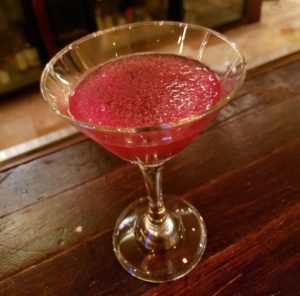
Corpse Not-Quite Reviver
1 oz. lemon juice
1 oz. orange liqueur
1 oz. Lillet Blanc
1 oz. gin
Peychaud’s float
This drink is based on Corpse Reviver #2, but with a twist, since this is an Orpheus and Eurydice drink. The Peychaud’s float drips into the drink, creating a bloody stain on the corpse reviver. We tried it with the Peychaud’s floating on top (top picture) and then once it started to blend, we added 2 more little drops on top, to represent the snakebite that originally did Eurydice in. This is best drank while listening to some good music and getting a little nostalgic for things that might have been.
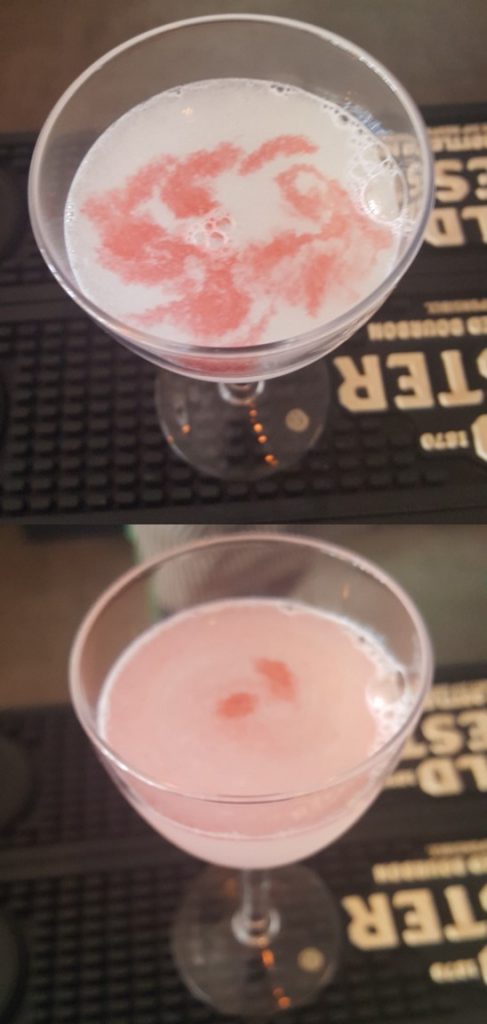
Icarus
1 ½ oz. gin
½ oz. maraschino
¼ oz. honey
¼ oz. crème de violette
Lemon garnish
This is an adaptation of a drink called the Aviation. We added some honey, as a nod to the wax in Icarus’ wings, and the lemon garnish is wing-shaped. This is best drank while making big plans – possibly too big plans. The garnish doesn’t stay balanced very well, which is sort of a metaphor for falling into the sea. If you’ve mediated upon crashing into the sea and you still like your big plans, go for it – you’ve done your due diligence!
This is best drank while making big plans – possibly too big plans. The garnish doesn’t stay balanced very well, which is sort of a metaphor for falling into the sea. If you’ve mediated upon crashing into the sea and you still like your big plans, go for it – you’ve done your due diligence!
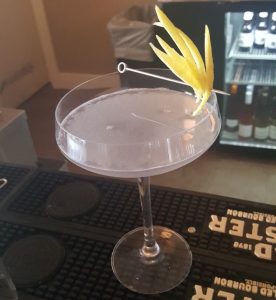
Memnoni
1 oz. Cocchi Storico Vermouth di Torino
1 oz. Campari
1 oz. gin
Activated charcoal
Based on a Negroni, this combines the colors of rosy-fingered Dawn, the mother of Memnon, with some activated charcoal, as a nod to Memnon’s blackness, as the king of Ethiopia.
Drink this while hanging out with your classics friends and speculating about the content of lost and fragmentary works, starting with the Aethiopis.
Because Zeus makes Memnon immortal, at Eos’ urging (in the Aethiopis, according to Proclus), this is a good drink to drink while contemplating mortality and immortality. Ideal soundtrack: Who Wants to Live Forever (by Queen, featured prominently in Highlander)
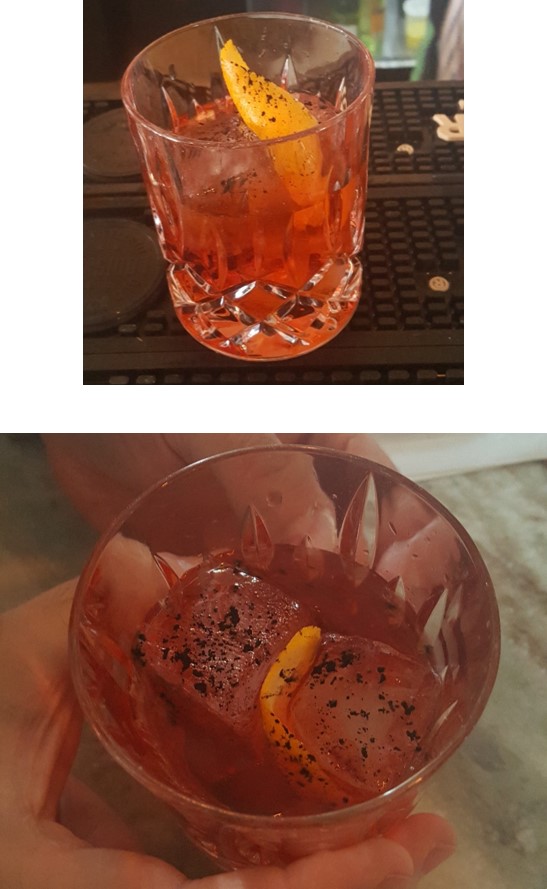
Nemean Lion
2 oz. bourbon
½ oz. allspice dram
½ oz. lemon juice
1 tsp demerara syrup
3 dashes of angostura bitters
Egg white
Celery garnish
This is based on a drink called the Lion’s Tail, though with a few tweaks (more bitters, demerara syrup instead of simple syrup). The addition of egg whites are a nod to Heracles’ labor of the Stymphalian birds, and the celery garnish is in honor of the prize given to the winner at the Nemean Games (a crown of celery leaves).
In true ancient historian form, Chris Baron had a fun and incredibly obscure story to share about Timoleon and a celery omen. Cheers to fragmentary historians and the people who associate with them!
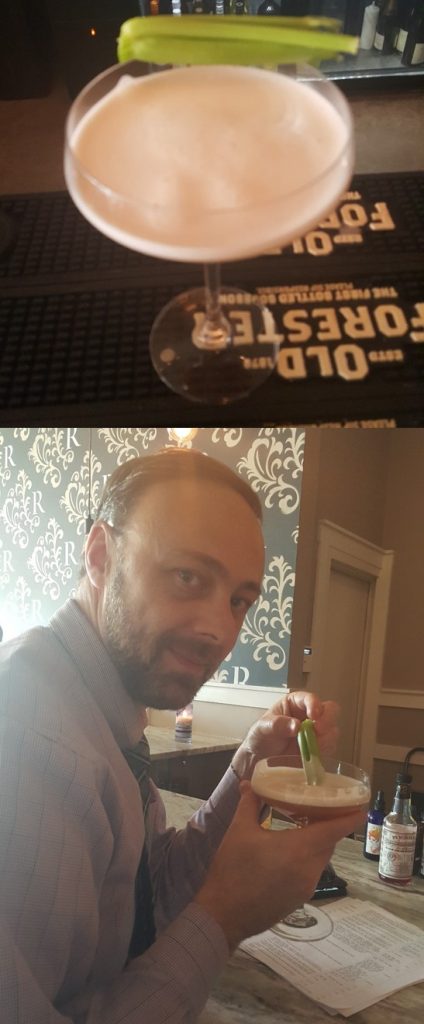
The Orestes
Combine, in a champagne flute:
A bar spoonful of sugar
1 dash of cardamom bitters
1 oz absinthe
Top off with sparkling wine
Hooboy, this was the only real failure of the bunch, though it was a mythologically apt failure. The thought here was something that tasted like revenge. And what tastes more like revenge than absinthe?
Problem is, we overshot a bit. It tasted not good. With an extra not-good aftertaste. So we tried adding another ½ oz of bar sugar and some amaretto to cut the nasty aftertaste. It was . . . less bad then, but still not particularly good. So, let’s call this an important lesson about cycles of vengeful killing. You can make it less awful, but it’s still awful and no one enjoys it. I would suggest that you do not try cycles of vengeful killing or this drink.
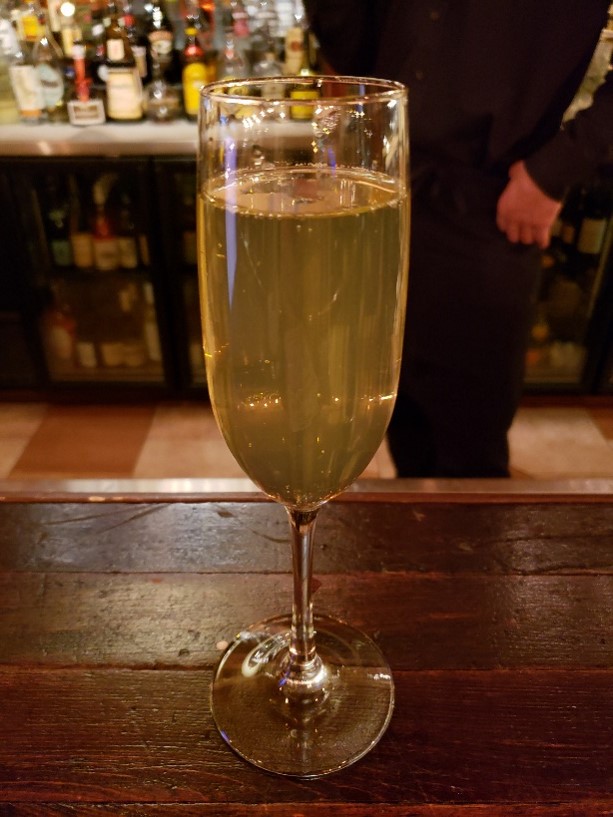
Golden Danae
¼ oz. Strega
½ oz. St. George Spiced Pear Liqueur
1 ½ oz. gin
I refuse to call this a golden shower, because I’m an adult. And this drink is delicious, and Danae’s memory deserves better than golden shower jokes. This is best drank when it seems like no matter how hard you try, you can NOT avoid annoying people – especially if those people are men who are trying to sleep with you. Ask the bartender to smell the cork-thing in the bottle of St. George Pear Liqueur. It smells delicious, like warmth and joy. The perfect antidote for persistent annoyances.
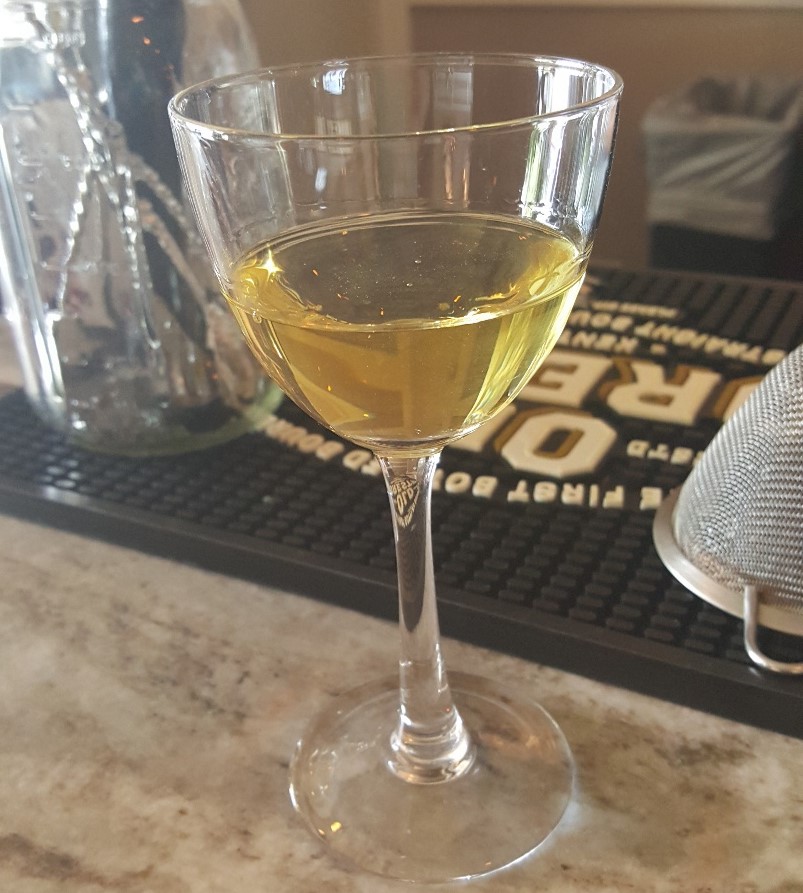
Corinthian Long Island
½ oz vodka
½ oz gin
½ oz white rum
½ oz tequila,
½ oz ginger liqueur
A hearty squeeze of lemon
Float hibiscus
Serve in a short (6 oz) glass
If there’s one thing that classicists of all stripes can agree on, it’s that Jason is a real douchebag. So, I started with your basic Long Island (it seems like that would be his go-to drink, along with vodka and Red Bull, natch). We added a little ginger liqueur, since ginger (assuming ζιγγίβερις is in fact ginger) is, per LSJ, “an Arabian spice-plant, the root of which was used in medicine.” Something imported from somewhere to the east, with healing powers but also with a spicy (dare I say, hot?) flavor . . . sounds like Medea! We “floated” a hibiscus liqueur, though it sunk right to the bottom, giving this a pleasingly red tinge, as if the drink itself is saying “hey, Jason, don’t get comfy bro. This ends bloody.” (Side note – I originally imagined this with elderflower liqueur, but hibiscus worked in a pinch)
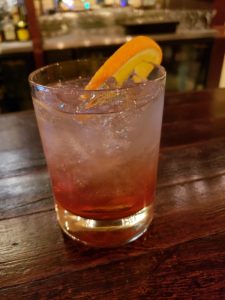
Medea
A shot of Malört
Malört is the Swedish word for wormwood – it tastes like trees and death and angry vengeance. Particularly the aftertaste. VERY bitter aftertaste. This makes sense, because Malört is a type of bask, which is the Swedish word for bitter.
Deep dive on wormwood! The scientific name is Artemisia absinthium, and the angry vengeance of Artemis feels right for a Medea shot. This should probably be drank with female friends who are seething with anger. So, maybe try to order a bottle of it – you might need a lot of it!
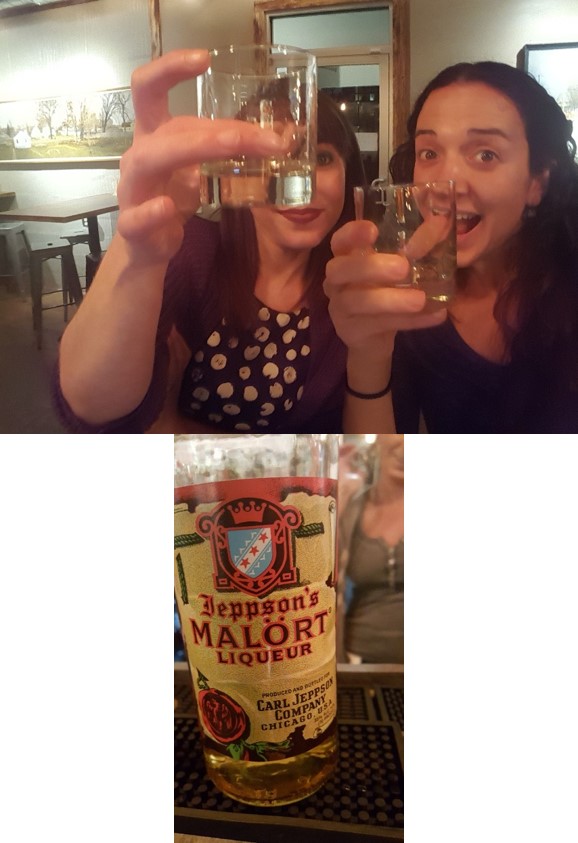
Golden Ass
½ oz. lime
2 oz. gin
Top with ginger beer
5 dashes of Angostura bitters
This is a variation (as you might have noticed from the cup) on a Moscow Mule, but with more Apuleius. We added in Angostura bitters because the herbal flavor felt appropriately witchy – that’s what turns it from a Mule to an Ass! If you make it with vodka instead of gin, the flavors of the bitters don’t come out as well. Still tasty, but not as good – that’s called a Lucian’s Ass.
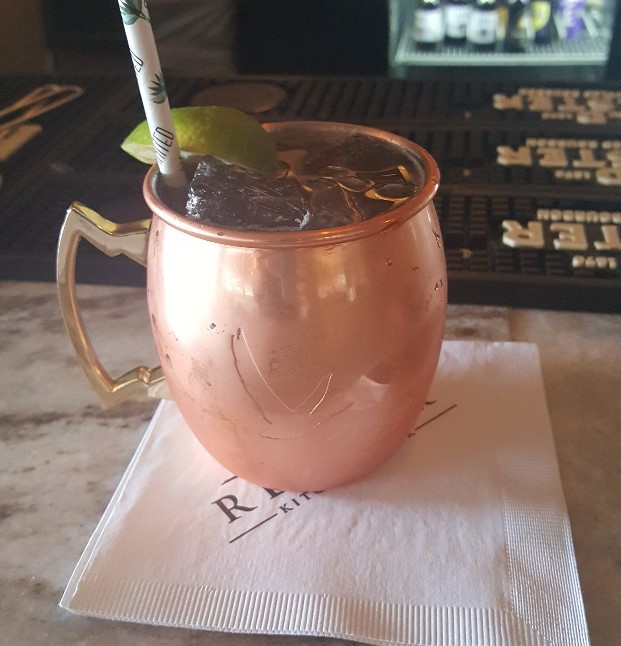



no replies